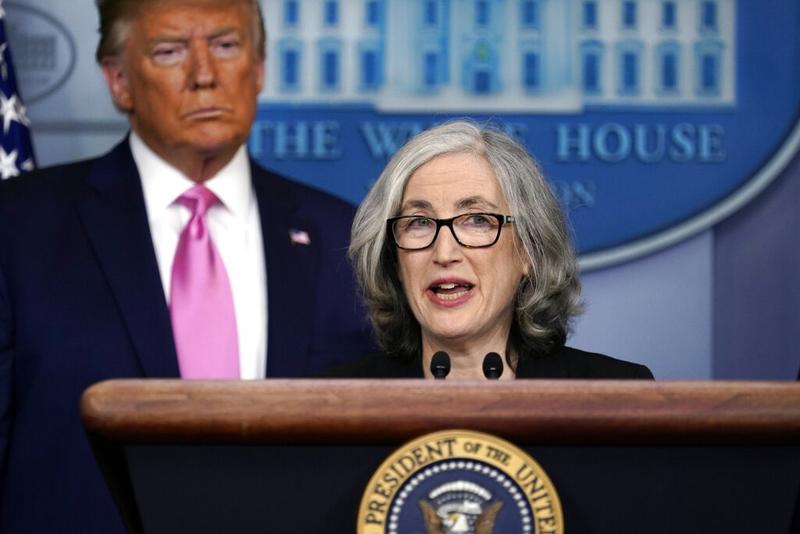 In this Feb 26, 2020 file photo, Anne Schuchat, principal deputy director of the Centers for Disease Control and Prevention, speaks during a news conference about the coronavirus in the Brady Press Briefing Room of the White House in Washington, as President Donald Trump stands behind her. (EVAN VUCCI / AP)
In this Feb 26, 2020 file photo, Anne Schuchat, principal deputy director of the Centers for Disease Control and Prevention, speaks during a news conference about the coronavirus in the Brady Press Briefing Room of the White House in Washington, as President Donald Trump stands behind her. (EVAN VUCCI / AP)
The US government reacted too slowly to contain the COVID-19 pandemic as the virus was spreading from Europe, which led to the surge of infections and deaths in the country, a top official at the US Centers for Disease Control and Prevention said.
Anne Schuchat, second in command at the CDC, said that limited testing and delayed travel alerts contributed to the rapid spread of the novel coronavirus across the United States.
An article published by the CDC on Friday, which was written by Schuchat, re-examined the US government's response to the coronavirus and suggested that the country's top public health agencies missed chances to contain the spread of the disease.
Anne Schuchat, second in command at the US CDC, said that limited testing and delayed travel alerts contributed to the rapid spread of the novel coronavirus across the United States
Schuchat said in the article that nearly 2 million travelers from Italy and other European countries arrived in the US in February, fueling the spread of the virus, while the US government didn't halt travel from European countries until March 11.
"The extensive travel from Europe, once Europe was having outbreaks, really accelerated our importations and the rapid spread," she told The Associated Press. "I think the timing of our travel alerts should have been earlier."
ALSO READ: Americans begin to surface from isolation as states ease lockdown
She also noted in the article that over 100 people who had been on nine separate Nile River cruises during February and early March had come to the US and tested positive for the virus, which nearly doubled the number of confirmed cases in the US at that time.
The explosive effect of some mass gatherings in late February has also caused a jump in the number of coronavirus cases, including a scientific conference in Boston and a funeral in Georgia.
Schuchat said that in retrospect, taking action earlier could have delayed further amplification of the novel coronavirus outbreak in the US, or delayed the speed of it.
As of Saturday, there were more than 65,000 deaths due to the COVID-19 disease in the US and more than 1.1 million confirmed cases, according to data from Johns Hopkins University. The US is currently the worst-hit country by the virus.
Globally, there have been 3,272,202 confirmed cases of COVID-19 as of Saturday, including 230,104 deaths, according to the World Health Organization.
The WHO reiterated on Friday that the novel coronavirus that causes COVID-19 disease originates from nature.
US President Donald Trump said on Thursday that he had seen strong evidence that the virus originated from a lab in Wuhan, despite a statement by the US intelligence community that it concurs with the scientific consensus that the COVID-19 virus was not man-made nor genetically modified.
"We listened again and again to numerous scientists who looked at the sequences and looked at this virus. And we are assured that this virus is natural in origin," said Mike Ryan, executive director of the WHO Health Emergencies Programme, during a virtual news conference.
READ MORE: Top US spy agency says coronavirus 'not manmade'
Ryan emphasized the importance of better understanding the virus and understanding the animal-human interface and how the barrier between them was breached.
"The purpose of understanding that is that we can put in place the necessary prevention and public health measures to prevent that happening again anywhere," he said.
At the Friday conference, Maria Van Kerkhove, technical lead of the WHO Health Emergencies Programme, said it is "very very welcome news" to hear that there are no more severe cases and no more patients of COVID-19 in Wuhan.
"China has worked very hard to bring the outbreak under control," said Van Kerkhove, a US scientist who spent two weeks in China during the peak of the outbreak.
READ MORE: WHO congratulates Wuhan on clearing all COVID-19 cases
She said the world has learned from China as it has learned from all countries as they are dealing with COVID-19.
US grocery store owners are being urged to do more to protect employees during the coronavirus pandemic after at least 72 workers died and thousands were infected with the virus.
Contact the writers at aiheping@chinadailyusa.com
Chen Yingqun in Beijing, Belinda Robinson in New York and agencies contributed to this story.


